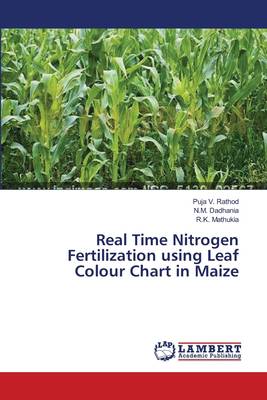
- Afhalen na 1 uur in een winkel met voorraad
- Gratis thuislevering in België vanaf € 30
- Ruim aanbod met 7 miljoen producten
- Afhalen na 1 uur in een winkel met voorraad
- Gratis thuislevering in België vanaf € 30
- Ruim aanbod met 7 miljoen producten
Zoeken
Real Time Nitrogen Fertilization using Leaf Colour Chart in Maize
Puja V Rathod, N M Dadhania, R K Mathukia
Paperback | Engels
€ 61,45
+ 122 punten
Omschrijving
The soil testing or leaf analyses are expensive and time-consuming. In addition, tissue testing is a destructive method, which limits its use as a diagnostic tool for nutrient use efficiency of cereal plants. The rapid tissue tests for cereal plants are not widely used because critical levels can vary greatly from site to site and can change rapidly over time. Matching crop N demand with flexible, split applications may have economic and environmental advantages above supplying fixed rates at fixed growth stages. In the absence of accurate and rapid N testing methods, many growers currently apply N fertilizer in excess rather than risk of yield reduction through N deficiency. Crop growth and crop need for supplemental N can be strongly influenced by crop-growing conditions, crop and soil management, and climate, which can vary greatly among fields, villages, seasons and years. One of the emerging technologies is the determination of the plant for N status in combination with soil testing. Leaf colour chart (LCC) is the promising tool developed in recent years for need-based N management in rice crop. Thus, the experiment was conducted to validate the LCC for maize.
Specificaties
Betrokkenen
- Auteur(s):
- Uitgeverij:
Inhoud
- Aantal bladzijden:
- 132
- Taal:
- Engels
Eigenschappen
- Productcode (EAN):
- 9783659203763
- Verschijningsdatum:
- 25/02/2014
- Uitvoering:
- Paperback
- Formaat:
- Trade paperback (VS)
- Afmetingen:
- 152 mm x 229 mm
- Gewicht:
- 204 g

Alleen bij Standaard Boekhandel
+ 122 punten op je klantenkaart van Standaard Boekhandel
Beoordelingen
We publiceren alleen reviews die voldoen aan de voorwaarden voor reviews. Bekijk onze voorwaarden voor reviews.











